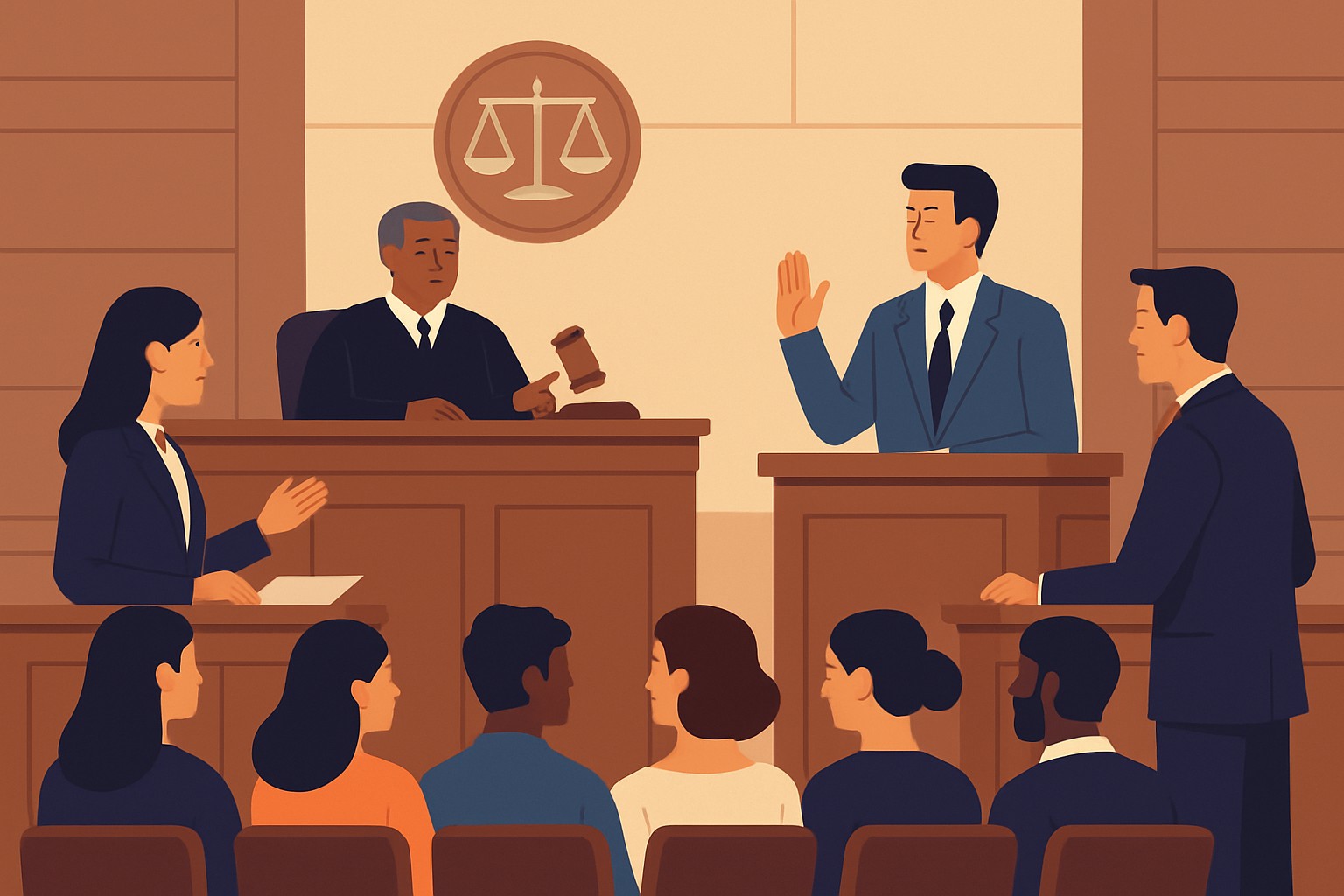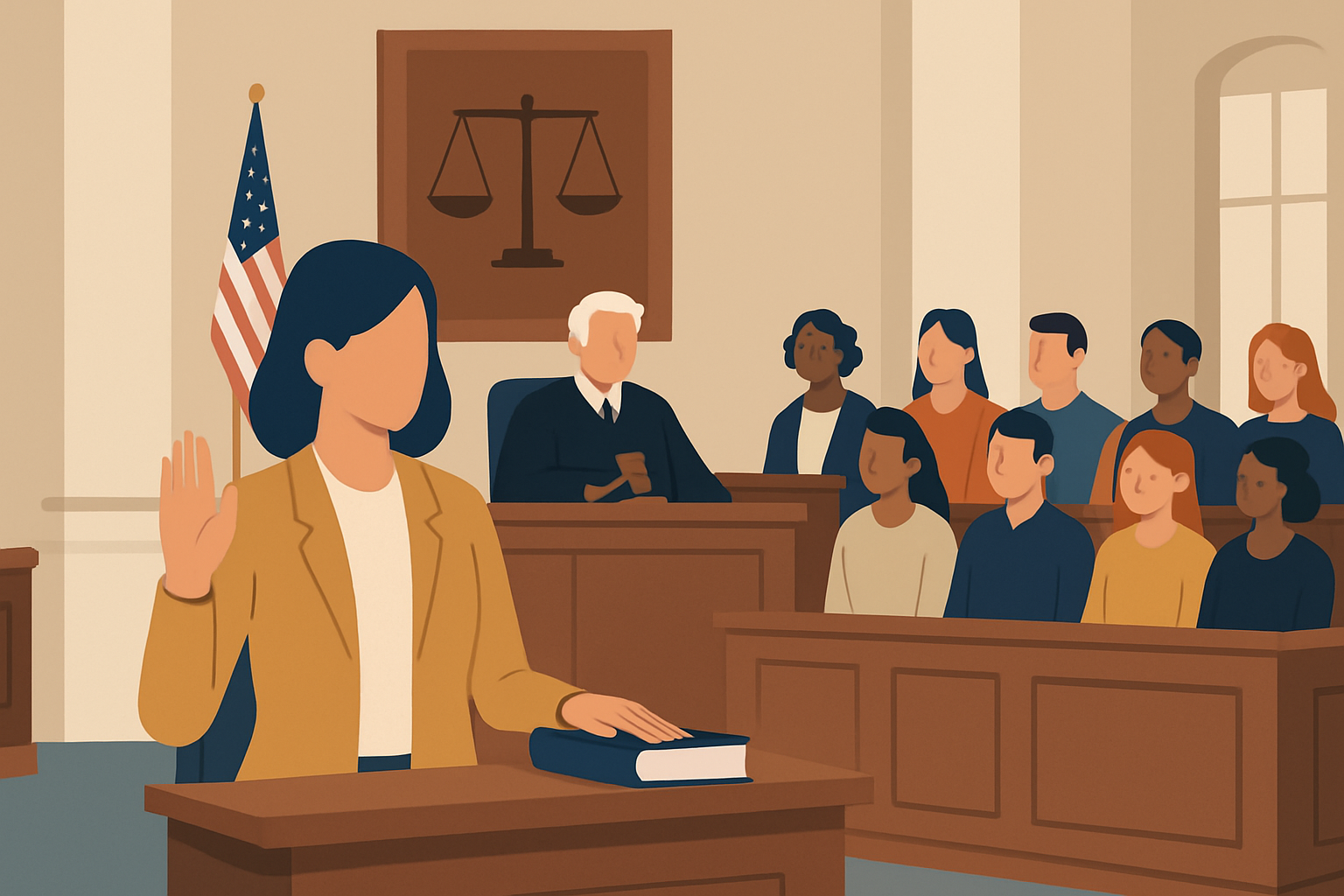
What Happens When You Lie Under Oath in Legal Proceedings?


If you lie in court, what happens can be serious—the consequences are severe and not something you want to face. This article looks at what it means to lie under oath and why honesty is vital for justice to work. It also covers the potential penalties for knowingly giving false testimony.
What the Oath Really Means in Legal Proceedings
Before stepping up to the witness stand, people involved usually take an oath—a solemn promise to spill nothing but the truth. Think of it as both a legal anchor and a moral nudge, gently urging honesty from all parties.
It’s really important to draw a clear line between sworn testimony given under oath and those unsworn statements or more casual declarations that don’t carry the same weight.
What Really Counts as Lying Under Oath?
Lying under oath is called perjury, which means you are deliberately giving false information while sworn in. This can range from outright lying to conveniently leaving out important details or providing answers designed to mislead. Two major factors determine if a lie counts as perjury. First is intent, which means the conscious decision to deceive someone. Second is materiality, where the falsehood must be significant enough to influence the court's decision.
- Stating things that clash with well-established facts or solid evidence as if facts were optional.
- Giving testimony that contradicts itself at various points throughout the case and makes you wonder if someone’s been daydreaming.
- Holding back important information that should be shared, leaving others in the dark when they deserve to be in the know.
- Leaning on fabricated or altered evidence to prop up false claims that rarely stand up to even a casual glance.
If You Lie in Court What Happens: The Legal Risks You Really Need to Know
Perjury is a crime almost everywhere and people who fib under oath usually face serious consequences like fines or prison time, sometimes both. Throwing out lies can really throw a wrench in the legal gears and often weakens the whole process.
| Jurisdiction | Type of Penalty | Typical Sentence Range | Additional Legal Ramifications |
|---|---|---|---|
| United States | Criminal charges for perjury | Sentences can run up to 5 years behind bars | Along with fines, probation, and, of course, a serious hit to one's credibility |
| United Kingdom | Offense of perjury | Sentences might stretch up to 7 years in prison | Plus, you could face contempt of court and obstruction of justice charges |
| Canada | Perjury under Criminal Code | Sentences can climb as high as 14 years in prison | This can seriously affect any ongoing legal cases |
| Australia | Perjury and related offences | Sentences may be as long as 15 years in prison | Potentially brings civil penalties and professional sanctions knocking at the door |
People who fib in court often find themselves dealing with many other troubles. Courts may slap them with contempt charges or tack on counts for obstructing justice. They may even bar them from testifying down the line. On the professional front, getting caught lying under oath usually tarnishes one’s reputation badly and can cast a long shadow over careers—especially in fields where trust and integrity are absolutely essential like law, finance and public service.
How Courts Sniff Out and Pin Down Lies Under Oath
Courts and attorneys lean on a variety of clever techniques to sniff out falsehoods in testimony. Cross-examination really puts inconsistencies and gaps under the microscope, while lining up statements against documents or physical evidence often exposes contradictions you might otherwise miss.
- Spotting inconsistencies and contradictions that pop up when testimony is repeated.
- Backing up or questioning claims with solid documents, recordings or a few witnesses who saw it firsthand.
- Bringing in forensic analysis to double-check physical or digital evidence because a keen eye rarely misses a trick.
- Calling on expert witnesses to break down complex or technical stuff and make it easier to understand.
Proving perjury is no walk in the park—it requires a pretty high level of proof. Prosecutors have to show that the false statement wasn’t just a slip of the tongue but was made on purpose, and that it actually mattered to how the case played out.
Illustrations and Case Studies That Shine a Light on Perjury
There have been quite a few eye-opening cases where people got nailed for lying under oath. Take for example a major political scandal where a government official spun a web of false testimony to cover up some shady business, ultimately landing behind bars.
"Honesty in court isn’t just a nice-to-have; it’s the very backbone of justice. When the truth gets sidelined, the whole legal system can wobble on shaky ground." – Judge Lisa M. Duffy
Frequent Misunderstandings About Lying in Court
It’s a pretty common misconception that small fibs or conveniently leaving out a few details in court won’t come back to bite you, or that lawyers can totally have their clients’ backs when they’re less than honest—without any fallout. Even tiny little untruths can land someone in hot water with perjury charges.
- Even those small ‘white’ lies you might think are harmless in court can come back to bite you when they are relevant to the case.
- It’s not only witnesses who can get into trouble, but parties involved and even their attorneys may face perjury charges.
- Trying to protect family or friends by bending the truth is not just frowned upon, it can actually land you in deeper legal trouble.
- Perjury charges can be tough to prove, yet they are taken seriously to keep the wheels of justice turning smoothly.
What To Do If You Ever Find Yourself Feeling a Bit Wobbly About Your Testimony
If you find yourself needing to give testimony but aren’t quite sure on the facts or details, it’s best to be honest about what you don’t know. Before stepping up to the stand, have a quick chat with a legal professional. Rather than taking a wild guess or making assumptions, it’s usually smarter to simply say you don’t recall or aren’t certain.
Witnesses and defendants should do their best to be truthful by focusing on the questions and answering them clearly. Jotting down notes and reviewing the facts ahead of time can help. Not hesitating to ask for clarification if a question feels murky can also steer clear of accidental perjury.

A witness taking the oath in a courtroom while the judge oversees the proceedings.
The Real Deal on Honesty’s Role in Justice
Truthful testimony is the bedrock of any justice system that works. If you lie in court what happens can undermine the entire process - it deprives judges and juries of reliable information needed for fair decisions, violates the rights of all parties involved, and erodes public trust in legal institutions.
"When falsehoods sneak their way into the courtroom, trust in the law often takes a serious hit. Sticking to the truth isn’t just important—it’s absolutely essential for keeping justice intact and democracy safe. After all, without that cornerstone, everything else starts to wobble." – Professor Elena Garcia, Legal Scholar





